Merkel reaches 10-year mark under a cloud
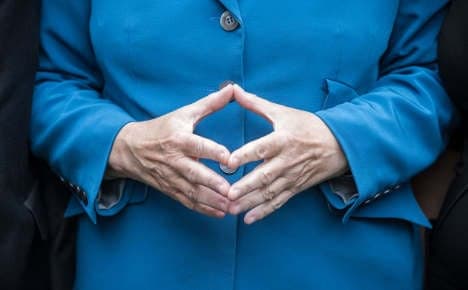
Chancellor Angela Merkel celebrates ten years in power on Sunday, facing the fight of her political life over her liberal stance on refugees, which provoked a party revolt, and fresh fears sparked by the Paris carnage.
A Protestant pastor's daughter who grew up behind the Iron Curtain, Angela Merkel has made an unprecedented journey to become chancellor of Germany and the world's most powerful woman.
She has been derided as the eurozone's "austerity priestess", praised by desperate refugees as "Mama Merkel" and labelled by the Economist magazine as "the indispensable European".
Meteoric rise
Merkel was born Angela Dorothea Kasner in 1954 and was brought up in a small town in communist East Germany.
A star student, she excelled in Russian, which she has put to use in defusing the Ukraine conflict with President Vladimir Putin, who was a KGB officer in East Germany when the Wall fell in 1989.
At the time, Merkel, with a doctorate in quantum chemistry, was working in a Berlin laboratory, but quickly joined the nascent group Democratic Awakening.
It merged with the Christian Democrats, then led by chancellor Helmut Kohl, who fondly and patronisingly dubbed her "the girl".
Merkel's mentor was not the last politician to underestimate her and pay the price.
When he became embroiled in a campaign finance scandal in 1999, Merkel stuck in the knife, urging her party to drop the self-declared "old warhorse".
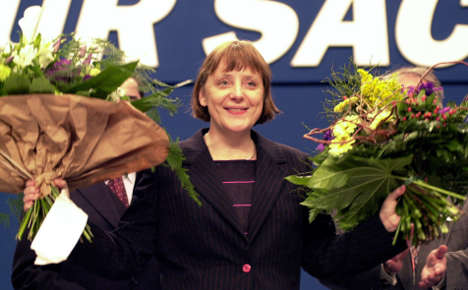
Angela Merkel is elected CDU leader in 2000. Photo: DPA
The bold move kicked off her own meteoric rise to becoming Germany's youngest-ever chancellor, and the first woman to take the job, in November 2005.
Seemingly indifferent to the trappings of power and lacking vanity, the twice-married, childless 61-year-old lives in a Berlin flat with her rarely seen husband Joachim Sauer.
She shops in a neighbourhood supermarket and spends holidays hiking in the Alps.
This air of ordinariness has made her a hit with German voters, who value the no-nonsense pragmatism and competence of "Mutti", or Mummy, and prefer her blandness to the charisma of some of her male predecessors.
It is when she has stepped out of this pattern and acted boldly - notably by deciding to scrap nuclear power after Japan's 2011 Fukushima disaster and again in the ongoing refugee crisis – that she has invited most criticism and opened herself up to attack.
Queen of Europe
Ten years after she took office, Merkel stands alone as the leader of a European Union that is grappling with multiple crises.
Over the years, Greeks have burned her effigy and eastern nations have blamed her for the flood of migrants, but Germany's economic dominance combined with the weakness of Merkel's counterparts have left her without rivals for the nickname "Queen of Europe".
"Because the EU has been so abysmal at anticipating crises, it has fallen to Merkel to prevent the implosion of the EU," Judy Dempsey of the Carnegie Europe think-tank told AFP.
Her first term started quietly as she rebuilt ties with Washington after Paris and Berlin opposed the US invasion of Iraq, while deflecting efforts by Putin to sow divisions in the EU.
It was her second term, however, that saw Merkel truly take the lead in Europe's dramas.
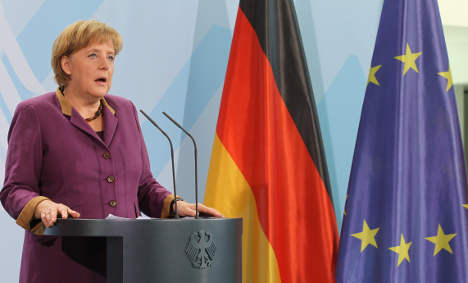
Photo: DPA
"Through the difficult situations and crises, she has played a leading role and a determining role," Janis Emmanouilidis, director of studies at the European Policy Centre, told AFP.
Merkel at first dithered over the eurozone debt crisis, and Germany's tough line on austerity made her a figure of hate in Greece where memories of the Nazi occupation run deep.
But she took the helm in deciding Greece's eurozone fate this year, holding head-to-head talks with Greek Prime Minister Alexis Tsipras at a summit as other leaders kicked their heels.
On Ukraine, Merkel and French President Francois Hollande went to Minsk to negotiate with Putin on a ceasefire in February this year while the rest of Europe was frozen out.
Merkel is reportedly a master at dealing with macho male politicians and she is reportedly the only European leader Putin respects.
But perhaps her most decisive - and controversial - display came with the migration crisis earlier this year.
Going rogue
The expected arrival of around one million asylum seekers in Germany this year alone, driven in part by Merkel's decision in September to open the border, has eroded her support at home.
The influential Die Zeit weekly has called it "the beginning of the end" of the Merkel era, while Der Spiegel sees the chancellor as increasingly "isolated".
Opinion polls show her conservative CDU-CSU alliance losing ground, now tallying just 34-percent support, versus 41.5 percent at the last national elections in 2013.
Merkel appears to be sacrificing many of those voters to the right-wing populist Alternative for Germany, which has surged to 10.5 percent support.
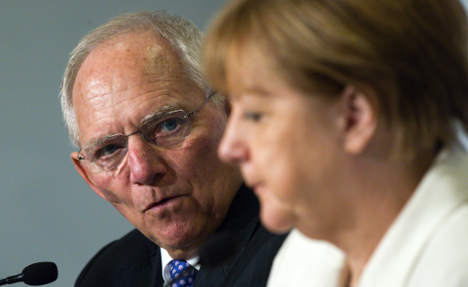
Angela Merkel with Finance Minister Wolfgang Scäuble. Photo: DPA
"There is no doubt about it, this is the biggest challenge of Merkel's time in office," says a senior aide, speaking on condition of anonymity.
Despite Merkel's "We will manage" mantra, doubts about how Germany will cope with the influx have also given rise to unprecedented backbiting.
Cabinet heavyweights Interior Minister Thomas de Maiziere and Finance Minister Wolfgang Schäuble have repeatedly gone rogue, daring to put distance between themselves and Merkel.
The chancellor has taken steps in recent weeks to calm the waters including tightening refugee policy, expanding border controls and accelerating the return of rejected asylum seekers.
But hardliners seized on the shock of the Paris terror attacks to demand still tougher measures.
"The days of uncontrolled and illegal immigration cannot continue. Paris has changed everything," fellow conservative Markus Söder said.
This time it's personal
Merkel gained a reputation for extreme pragmatism as she co-opted her opponents' most popular positions. Sociologist Ulrich Beck branded this approach "Merkiavellism" and it propelled her to record popularity.
But the refugee crisis' epoch-defining dimensions seem to have brought out the true convictions of the pastor's daughter.
"I think that this is a person with deeply held values who felt that there is only one legitimate, acceptable choice here," Germany expert Constanze Stelzenmüller of the Washington-based Brookings Institution said.
"There may be a feeling that this is her personal [Berlin] Wall and that is the challenge that she has to face."
However, analysts dismiss predictions of Merkel's imminent political demise as premature, noting that she has no apparent conservative successor and the Social Democrats, junior partners in her government, have failed to capitalise on her relative weakness.
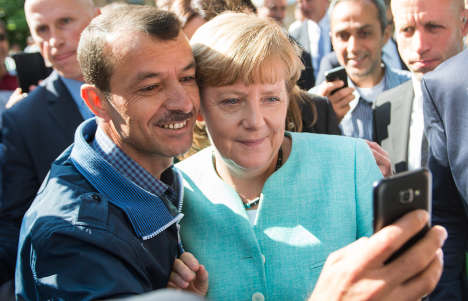
A refugee takes a 'selfie' with Merkel at a refugee reception centre. Photo: DPA
Respected philosopher Jürgen Habermas, a fierce critic of Merkel's unyielding policy in the eurozone debt crisis, can barely contain his praise for her principled stance on refugees.
"Who could have expected that from Frau Merkel?" he wrote.
Historian Paul Nolte said Merkel's support remained deeper and wider than often portrayed in the media.
"She has opponents in her own camp but she has also mobilised a lot of support, particularly in leftist civil society," he said.
"It was very clever, really -- she has a mandate from civil society for this policy and is as a result not as easy to topple."
Comments
See Also
A Protestant pastor's daughter who grew up behind the Iron Curtain, Angela Merkel has made an unprecedented journey to become chancellor of Germany and the world's most powerful woman.
She has been derided as the eurozone's "austerity priestess", praised by desperate refugees as "Mama Merkel" and labelled by the Economist magazine as "the indispensable European".
Meteoric rise
Merkel was born Angela Dorothea Kasner in 1954 and was brought up in a small town in communist East Germany.
A star student, she excelled in Russian, which she has put to use in defusing the Ukraine conflict with President Vladimir Putin, who was a KGB officer in East Germany when the Wall fell in 1989.
At the time, Merkel, with a doctorate in quantum chemistry, was working in a Berlin laboratory, but quickly joined the nascent group Democratic Awakening.
It merged with the Christian Democrats, then led by chancellor Helmut Kohl, who fondly and patronisingly dubbed her "the girl".
Merkel's mentor was not the last politician to underestimate her and pay the price.
When he became embroiled in a campaign finance scandal in 1999, Merkel stuck in the knife, urging her party to drop the self-declared "old warhorse".

Angela Merkel is elected CDU leader in 2000. Photo: DPA
The bold move kicked off her own meteoric rise to becoming Germany's youngest-ever chancellor, and the first woman to take the job, in November 2005.
Seemingly indifferent to the trappings of power and lacking vanity, the twice-married, childless 61-year-old lives in a Berlin flat with her rarely seen husband Joachim Sauer.
She shops in a neighbourhood supermarket and spends holidays hiking in the Alps.
This air of ordinariness has made her a hit with German voters, who value the no-nonsense pragmatism and competence of "Mutti", or Mummy, and prefer her blandness to the charisma of some of her male predecessors.
It is when she has stepped out of this pattern and acted boldly - notably by deciding to scrap nuclear power after Japan's 2011 Fukushima disaster and again in the ongoing refugee crisis – that she has invited most criticism and opened herself up to attack.
Queen of Europe
Ten years after she took office, Merkel stands alone as the leader of a European Union that is grappling with multiple crises.
Over the years, Greeks have burned her effigy and eastern nations have blamed her for the flood of migrants, but Germany's economic dominance combined with the weakness of Merkel's counterparts have left her without rivals for the nickname "Queen of Europe".
"Because the EU has been so abysmal at anticipating crises, it has fallen to Merkel to prevent the implosion of the EU," Judy Dempsey of the Carnegie Europe think-tank told AFP.
Her first term started quietly as she rebuilt ties with Washington after Paris and Berlin opposed the US invasion of Iraq, while deflecting efforts by Putin to sow divisions in the EU.
It was her second term, however, that saw Merkel truly take the lead in Europe's dramas.

Photo: DPA
"Through the difficult situations and crises, she has played a leading role and a determining role," Janis Emmanouilidis, director of studies at the European Policy Centre, told AFP.
Merkel at first dithered over the eurozone debt crisis, and Germany's tough line on austerity made her a figure of hate in Greece where memories of the Nazi occupation run deep.
But she took the helm in deciding Greece's eurozone fate this year, holding head-to-head talks with Greek Prime Minister Alexis Tsipras at a summit as other leaders kicked their heels.
On Ukraine, Merkel and French President Francois Hollande went to Minsk to negotiate with Putin on a ceasefire in February this year while the rest of Europe was frozen out.
Merkel is reportedly a master at dealing with macho male politicians and she is reportedly the only European leader Putin respects.
But perhaps her most decisive - and controversial - display came with the migration crisis earlier this year.
Going rogue
The expected arrival of around one million asylum seekers in Germany this year alone, driven in part by Merkel's decision in September to open the border, has eroded her support at home.
The influential Die Zeit weekly has called it "the beginning of the end" of the Merkel era, while Der Spiegel sees the chancellor as increasingly "isolated".
Opinion polls show her conservative CDU-CSU alliance losing ground, now tallying just 34-percent support, versus 41.5 percent at the last national elections in 2013.
Merkel appears to be sacrificing many of those voters to the right-wing populist Alternative for Germany, which has surged to 10.5 percent support.

Angela Merkel with Finance Minister Wolfgang Scäuble. Photo: DPA
"There is no doubt about it, this is the biggest challenge of Merkel's time in office," says a senior aide, speaking on condition of anonymity.
Despite Merkel's "We will manage" mantra, doubts about how Germany will cope with the influx have also given rise to unprecedented backbiting.
Cabinet heavyweights Interior Minister Thomas de Maiziere and Finance Minister Wolfgang Schäuble have repeatedly gone rogue, daring to put distance between themselves and Merkel.
The chancellor has taken steps in recent weeks to calm the waters including tightening refugee policy, expanding border controls and accelerating the return of rejected asylum seekers.
But hardliners seized on the shock of the Paris terror attacks to demand still tougher measures.
"The days of uncontrolled and illegal immigration cannot continue. Paris has changed everything," fellow conservative Markus Söder said.
This time it's personal
Merkel gained a reputation for extreme pragmatism as she co-opted her opponents' most popular positions. Sociologist Ulrich Beck branded this approach "Merkiavellism" and it propelled her to record popularity.
But the refugee crisis' epoch-defining dimensions seem to have brought out the true convictions of the pastor's daughter.
"I think that this is a person with deeply held values who felt that there is only one legitimate, acceptable choice here," Germany expert Constanze Stelzenmüller of the Washington-based Brookings Institution said.
"There may be a feeling that this is her personal [Berlin] Wall and that is the challenge that she has to face."
However, analysts dismiss predictions of Merkel's imminent political demise as premature, noting that she has no apparent conservative successor and the Social Democrats, junior partners in her government, have failed to capitalise on her relative weakness.

A refugee takes a 'selfie' with Merkel at a refugee reception centre. Photo: DPA
Respected philosopher Jürgen Habermas, a fierce critic of Merkel's unyielding policy in the eurozone debt crisis, can barely contain his praise for her principled stance on refugees.
"Who could have expected that from Frau Merkel?" he wrote.
Historian Paul Nolte said Merkel's support remained deeper and wider than often portrayed in the media.
"She has opponents in her own camp but she has also mobilised a lot of support, particularly in leftist civil society," he said.
"It was very clever, really -- she has a mandate from civil society for this policy and is as a result not as easy to topple."
Join the conversation in our comments section below. Share your own views and experience and if you have a question or suggestion for our journalists then email us at [email protected].
Please keep comments civil, constructive and on topic – and make sure to read our terms of use before getting involved.
Please log in here to leave a comment.